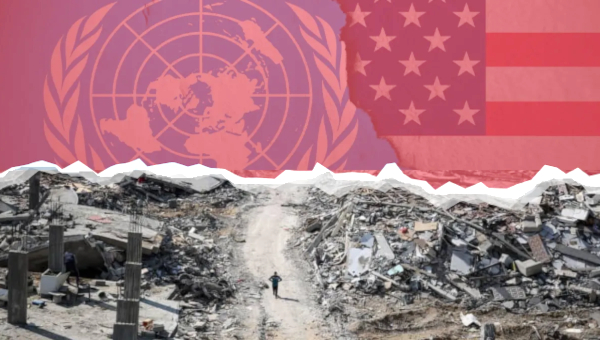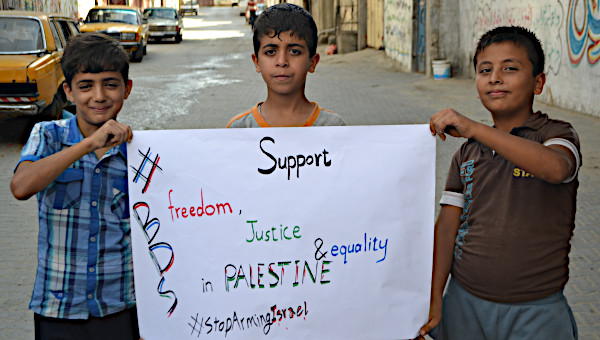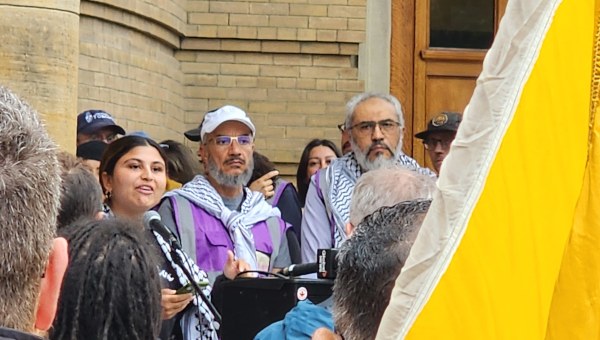Whose Side is the Law Always On? University of Toronto Palestine Solidarity Encampment
The University of Toronto won an injunction from the Ontario Superior Court of Justice (on Tuesday July 2nd) which requires pro-Palestine demonstrators to take down the physical structures they erected on campus (by 6:00 p.m., July 3rd), and in which they have camped since early May. The decision is a narrow one. It requires the dismantling of tents and other barriers to movement. It does not require the protestors to stop their protests on campus, unless they occur during the night (from 11 p.m. to 7:00 a.m.). In the end, the judge balanced the rights of the owner of the land against the rights of non-owners to use that land to protest.
In capitalist law that is like a boxing match between a heavyweight and a flyweight – a non-contest. In paragraph 4 of a judgement which ran to 96 pages and 255 paragraphs, the judge, Justice Markus Koehnen, noted that “given the way the law and the facts intersected in this case it would have been possible to write the reasons in only a few pages. Doing that would have not, however, given the parties or intervenors the sense that they have been heard…” That is, the many parties (and there were oodles of them!) had made what the judge saw as presentations of non-legally relevant factual evidence or non-legally pertinent legal arguments, emotive as they were, visceral as they were about the political issues in play.
The legal fight and its resolution stepped away from the intensity of political struggle, a struggle which had led to expressions of raw emotions and which called into question fundamental concerns about the morality of Canada’s and Israel’s behaviour. Existential problems were reduced to manageable technical ones. That is law’s job. One of the main ways in which it helps capitalism maintain and perpetuate its hold is by transliterating disputes about the nature of our social relations into technical battles over formulaic laws, battles which exclude class and history from consideration.
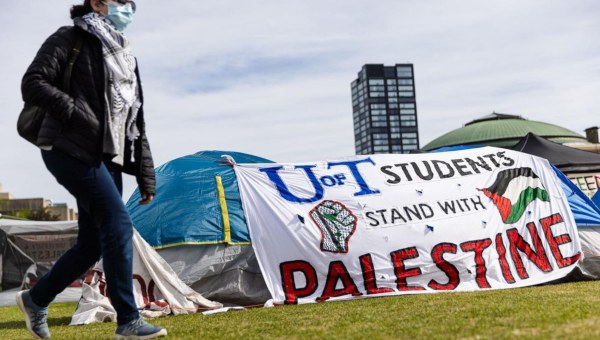
What the Protestors Wanted
Protestors see Israel’s occupation and current violent repression of Palestinians as anti-human conduct, as crimes, maybe as genocidal acts. They do not want to be seen as participating supporters of this. They want to persuade Canadian governments, institutions and private actors to drop their support for Israel. Financial support which arms Israel in various ways comes under attack. Taking a leaf out of the tactics in previous fights launched on moral grounds, such as, for example, the grape boycotts in support of farmworkers in California or those launched against South Africa’s apartheid system, boycotts to impose economic pressure on Israel are a tool available to those who do not have a direct say in policy-making.
The demand made of the University of Toronto was that it, as a large wealth owner of billions in financial assets, should make sure that none of its wealth was being used to fund what the protestors argue to be Israel’s unacceptable repressions and wrongdoings. The University, of course, knew that such demands were being made of it, but had paid no attention. To give their views publicity and to gain leverage vis-à-vis the University, the protestors set up their encampment on an open field on the university’s campus (following alongside other protests on campuses across North America). They were making a political demand, based on political arguments imbued by a desire to save human lives and dignity. They knew, of course, that many see Israel’s actions very differently, indeed, as justifiable on moral grounds. But they also knew that a university is not a place where such an argument could easily be made and that such a conflicting view could not be easily presented or heard. As the judge was to explain, none of this mattered all that much when it came to apply the law.
What the University Wanted
The University wanted this potentially reputation-damaging activity to stop. It wanted to assert its right to control its own premises as it sees fit. It wanted to assert its right to allocate its investments as it sees fit. The relevance of these desires expressed as legal rights’ claims were, the judge decided, central to the case. But to rest their case on this bald assertion of property rights, as if they were more like feudal lords of the manor than a respected place of search for wisdom and promoter of tolerance for diverging views, was uncomfortable for the University. Thus, the University decorated its demands by making claims and offering evidence to meet the issues which really animated all the activists, the Jewish communities, faculty, students, donors, civil liberty groups, unions, NGO’s of all kinds. The University said that, while it believed in respecting everyone’s opinions, it could not allow people to feel insecure, afraid of being assaulted, subjected to hateful and discriminatory invective or worse, and that there were complaints of instances of such behaviour. Its argument that the encampment must end was, therefore, not based on a crude property claim, but on the very principle of tolerance and respectful disagreement to which universities such as the University of Toronto are, supposedly, deeply committed.
The Judicial Ruling
The judge felt, out of some patrician sense that he should honour seriously made arguments even if they were legally not central, that this tack permitted the contestants to present evidence of alleged and actual incidents and claims and counter-claims. It is important to note here that the protestors, who were held to be trespassers who could be removed by the force of law, were found to occupy the high ground by Justice Koehnen. He held the encampment activists and occupants had not been associated with any violence that may have occurred, that they had not spoken or acted in an antisemitic way and that slogans such as ‘From the River to the Sea, Palestine Shall Be Free’ were not per se antisemitic – everything depended on the context. So there.
These findings are significant as the battle between pro-Palestinian forces and the political elites and Jewish people in the Canadian diaspora continue. They undermine, as did very similar findings by the investigating judge at Toronto Metropolitan University over the content of an open letter of law students protesting the Israeli War on Gaza, the weaponization of antisemitism whenever protestors express their distaste for the current Israeli government and the Zionist project.
But despite the fact that there was a clear finding that on the issues that are the most intensely fought, that constitute the terrain of contest as to which side occupies the moral high ground, the pro-Palestinians had come out on top, the injunction was granted. In the end, the judge found that we are a society that assumes that the owners of private property have the ultimate right to decide how they shall use it. While he noted this as a shared understanding of social relations, it is not a statement about the state of nature. It is a restatement of the centrality of the sacrosanct nature of private property ownership as the structural and ideological basis for capitalist relations of production.
This is the reason why otherwise legal picketing cannot take place on the employer’s premises; why union organizers cannot approach workers on those premises without the employer’s consent, even though we live in a society where we applaud ourselves for promoting freedom of association and publicly acknowledging the legitimacy of trade unionism. This is why workers must obey the orders of the private property owner so that he can control its deployment, and why governments find it hard to force owners of property to use it for the public good. This is why it is so hard to tax rich people as they complain that it is wrongful to take away their private property to give it to others; this is why civil libertarians of all kinds need permission to demonstrate in certain areas because their very presence will interfere with the owners of private property owners’ enjoyment of their property (to which nature entitles them). This is why Toronto Mayor Olivia Chow’s first reaction to a demonstration by pro-Palestinians on a civic square at city hall without a permit was that it was an illegal gathering etc.
Capitalist Law Against Political Freedoms
As long as the law is allowed to govern these kinds of controversies, non-capitalists will be on the back foot. As the judge said so candidly in this case, it was, legally speaking, a dead easy case. Wealth wins over political freedom. Of course, this is so crass that the law (pretending to be liberal law), and in this case, the presiding judge, must sugar coat the inevitable conclusion, inevitable because of the dictate of capitalist law.
The judge pointed out that the protestors, after all, had made their point and now they could resolve it by exerting more pressure by continued and much more limited protests at the University. The University, being a virtuous site of rational discussion, has protocols and channels for vigorous discussions. Use those, said Judge Koehnen, and enough disruption of property ownership already. You have had your day on campus and now you had your day in court.
Reinforcement of this message is provided by the presiding judge’s careful examination of whether there were legal arguments which could furnish the pro-Palestinian group with arguments that the owner of property, the University of Toronto, should be more limited than those of other private landowners. To this end, he looked at the claim that the University was really a public body, not entitled to the unrestricted claims of a private owner, that it might be subject to the Charter of Rights and Freedoms which potentially furnishes some restraints on government agencies. He decided it was not but claimed that he was nonetheless respecting Charter values and had taken them into account. These arguments are likely to become fodder for much examination by critics and activists. Yet, as the judge said, they were side issues he had only looked at to make participants and the general public a little happier than they might be if he had just stuck to the only thing that mattered: the protection of the right of private ownership. His consideration of all these issues should be disregarded, as they were by him. Legally they do not form part of the rationale for his decision. They are makeweight arguments to sustain the pretence that law actually cares about liberal democratic principles.
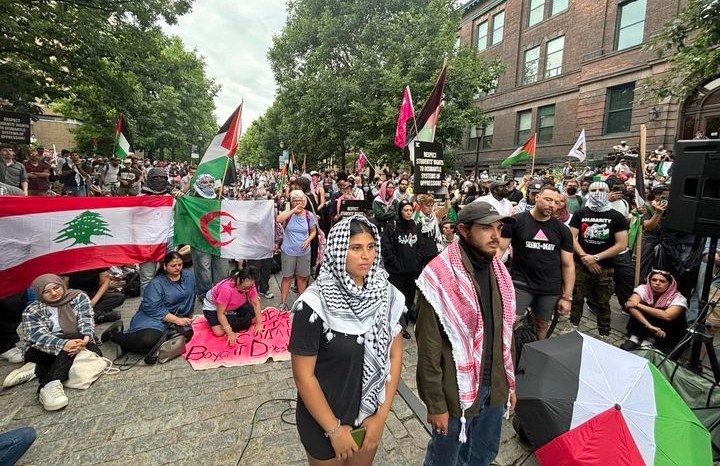
Hiding Behind Trespass Law To Keep Funding Israeli Apartheid
A final implication of this decision deserves mention. The judge’s finding that the encampment had been effective in that the messages and demands of the protestors had become widely known, draws attention to the fact that the encampment was about the only way that the protestors could have had as much success as they did. Merely writing letters and passing resolutions at the University (which had been done) exerted virtually no pressure on the University of Toronto administration. A verity comes into view.
The University makes its decisions about how it will spend its private property in private. The donors which may influence those decisions, make their promises of more funds or threats of less funds – to which the University surely pays attention – in private. They may have odious views. They do not have to subject them to public scrutiny. The protestors, having no private property, having no economic power to influence political decision-making, must make their claims in public. They have to force the private wealth owners to make their case in public, here to make the University make a public case that it is not morally bound to stop funding Israel’s conduct. This is why the University (and some of its donors) hide behind trespass law, a law designed to allow the owners of the means of production to coerce all others, economically and politically.
To sum it all up: in this case, the protestors did get some language which supported their claim of sincerity, of acting in a virtuous manner to achieve an admirable goal, namely to stop Canadians being made complicit in repressions, dispossessions and worse. They have been given the rights they always had: to protest in the way that the University already allows. The University may be more inclined to negotiate about the issue of divestment, although there is no public indication of this. It has preserved its right to run itself as a sovereign private property owner. So, the score of this legal battle is:
Wealth, 1.0; freedom of thought and expression, 0.1. •


